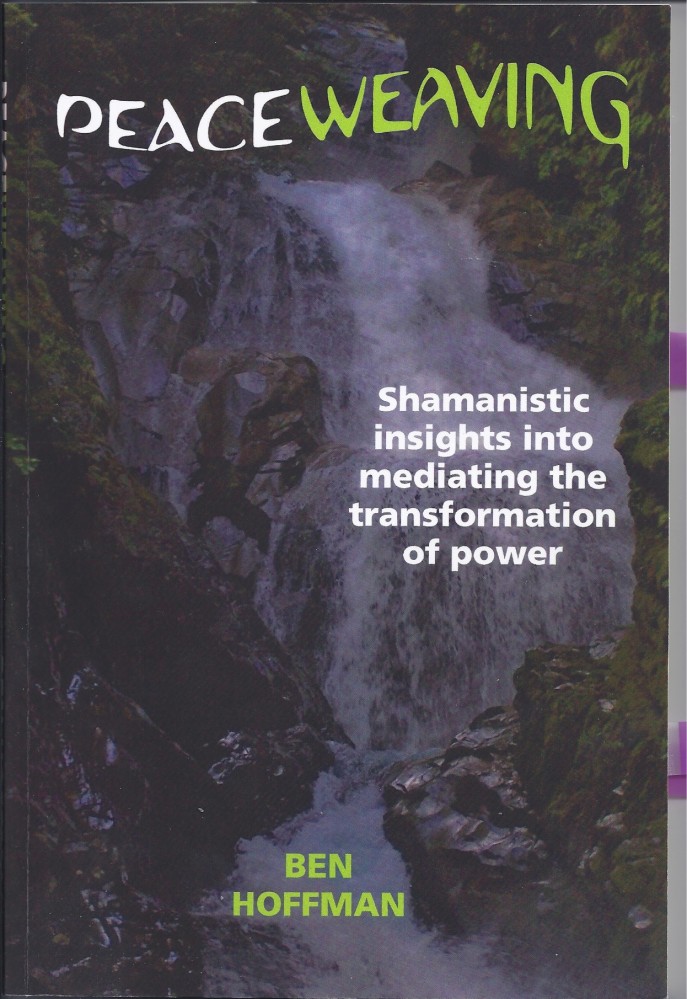PEACEWEAVING – Shamanistic insights into mediating the transformation of power, by Ben Hoffman, January 2013 – a review for Peacehawks, by Neil Patton
Peaceweaving is not your typical book on mediation. And Ben Hoffman is not your typical mediator. Hoffman has mediated a wide range of conflicts. From commercial agreements to prison hostage situations to disputes between violent African Warlords, his career has taken him from posh boardrooms to the naked risks of undisclosed jungle encampments.
Hoffman provides a thorough overview of the classic and de rigeur tools and tactics of the mediation trade, but his unique addition to the discipline is where he seeks to elevate it to a level on par with Maslowian self-actualization. Peaceweaving is an impressive and an intensely personal marrying of two concepts that just don’t normally roll off the tongue in any natural sequence: mediation and shamanism. Yes, shamanism. Not your typical mediation book. Not your typical mediator.
Hoffman’s is a very personal narrative of his journey through a vast mediation career which parallels his own evolution into “Shaman cum Mediator”. Yes, a shaman as mediator. Seems a bit far out there, but it is authentic, and it does have value for the profession.
For most practitioners in the conflict resolution field this might seem a bit of a reach, even implausible. For the hard core realists, this will be seen as pure flakiness, naivety wrapped in new age crystals and prayer flags. He speaks freely of his role as a mediator to eliminate negative energies and to move the conflicted parties’ relationships towards one of “power with” the other party and away from “power over” the other party.
Hoffman is aspirational, unbelievably aspirational. But this is an approach that seeks to be transformational, not just adding a new tactical process to the conflict resolution field. Hoffman’s career has led him to great challenges. This book is not so much about labour disputes and trade deals. Hoffman seeks to bring a new way of thinking to the most violent and protracted disputes of our times, and the ones just around the corner. This is a man who has looked straight into the eyes of African war lords who were responsible for mass killings, abducting children, and child soldiers, and he didn’t blink (though he does admit to suffering from intense internal anxiety from time-to-time).
What will be comforting to traditionalists and realists who dare to read deeply enough into Hoffman’s approach is that he understands that power is at the core of all conflict, and that failure to understand this is a critical error for any mediator at any level. It is all about power, but for Hoffman it is also about transforming how the parties relate to and use their power. Hoffman’s view is that the greatest challenge is to transform the parties and their relationship with their power and the power dynamics in the conflict. This is where he seeks to transform the art of mediation. In this regard Hoffman’s understanding of the challenges in mediation is spot on. He gets it: it is all about power and the parties’ own beliefs about their relative power. He is no naïf in this regard.
Ultimately, Hoffman asks: what is my role as mediator? For him it can be as ambitious as seeking to alter and transform the core values of the parties in conflict. Pretty aspirational stuff (US foreign policy has been known to try the same). In Hoffman’s view not all mediators will answer this question the same. Most will not likely answer like Hoffman. After all, he seeks to weave peace in the great violent conflicts of our times. The challenge of a commercial dispute does not raise the same transformational goal for him, nor should it. That’s about commerce, not peace. Hoffman is dealing in human lives, human dignity, and transforming parties upward from years and decades of violence.
His proposal that mediators elevate their role to that of a shaman is indeed daring, bold, and even unthinkable. But that’s what true visionaries and innovators do. A man on the moon in 1940? Unthinkable. The Berlin wall coming down in 1970? Unthinkable. Film clips and photos sent from mobile phone to mobile phone in 1980? Unthinkable. Mediator as Shaman? …unthinkable…?

